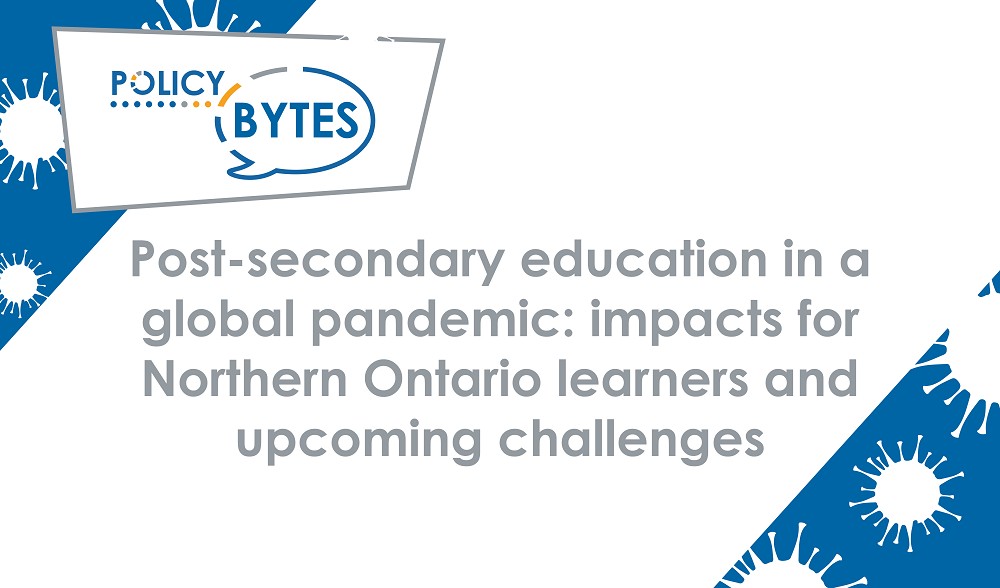Post-secondary education in a global pandemic: impacts for Northern Ontario learners
September 15, 2020 - This article was first published in First Policy Response. The author was asked to contribute responses to the following questions: What issue are you most concerned about when it comes to resuming classes, and how should we deal with it? How will post-secondary education be different two years from now as a result of COVID-19? The original publications, along with responses from other contributors, can be found here and here.

It is becoming increasingly likely that most post-secondary courses will be online this fall.
However, this does not inclusively engage all Northern Ontarians. Nearly 121,000 dwellings in Northern Ontario have bandwidth speeds below the Canadian Radio-television and Telecommunications Commission’s target downloading and uploading speeds (50/10 mbps). And almost 38,000 of those dwellings only have access to a fixed internet connection, which isn’t stable and can be weakened by weather conditions and physical obstructions.
Rural areas of Ontario’s northern regions are disproportionately affected by the lack of digital infrastructure. As an example, downloading basic documents from an email at Lac La Croix First Nation can take an hour. How, then, are rural students in Ontario’s north supposed to easily access and participate in online classes this fall?
The federal government promised up to 6 million dollars to ensure all Canadians have access to internet of an adequate speed by 2030, but it is unlikely that developments on this will be made in time to help online learners this fall.
In the meantime, post-secondary institutions themselves should survey how many students are living in rural areas without quality internet access and what their course enrolments are. To allow rural students to actively participate, post-secondary institutions could require their instructors to pre-record online lectures, allow lengthy time windows to submit assignments, and not place high emphasis on Zoom class participation. Concessions like these need to be made for rural students to fully participate in online higher education.
The pandemic could also mean that post-secondary courses remain online for the next two years. While this allows learners to complete their studies remotely, some of the benefits students get from post-secondary learning will be lost.
For most new graduates to get work in their fields, they need more than just their degree or diploma. The soft skills graduates learn from study abroad experiences, experiential learning and leadership in extracurriculars, for example, all go a long way in job competition.
The heightened hurdles for students to gain experiences this summer and the lack of opportunities to develop soft skills in post-secondary settings could mean new graduates will have fewer marketable skills, and will suffer in the labour market.
Of course, there was a federal plan to address summer experiences for students. While the Canada Student Service Grant (CSSG) has become associated with controversy, it’s students that are disadvantaged. As we approach the last month of summer break, there does not appear to be a solution.
Post-secondary leaders should consider ways to engage students beyond Zoom classes. Supporting students’ remote co-ops and offering remote work-integrated learning opportunities are potential options. Perhaps non-profits who could have benefitted from CSSG volunteers could partner with education institutions so students could receive course credits to volunteer during the semester. The federal funds allocated to the CSSG could be directed to post-secondary institutions to help facilitate these opportunities and pay students for their contributions. Not only will this make institutions more competitive, students will benefit post-graduation.
Write for us
Hilary Hagar was a Research Analyst at NPI
The content of Northern Policy Institute’s blog is for general information and use. The views expressed in this blog are those of the author and do not necessarily reflect the opinions of Northern Policy Institute, its Board of Directors or its supporters. The authors take full responsibility for the accuracy and completeness of their respective blog posts. Northern Policy Institute will not be liable for any errors or omissions in this information, nor will Northern Policy Institute be liable for any detriment caused from the display or use of this information. Any links to other websites do not imply endorsement, nor is Northern Policy Institute responsible for the content of the linked websites.
Northern Policy Institute welcomes your feedback and comments. Please keep comments to under 500 words. Any submission that uses profane, derogatory, hateful, or threatening language will not be posted. Please keep your comments on topic and relevant to the subject matter presented in the blog. If you are presenting a rebuttal or counter-argument, please provide your evidence and sources. Northern Policy Institute reserves the right to deny any comments or feedback submitted to www.northernpolicy.ca that do not adhere to these guidelines.
